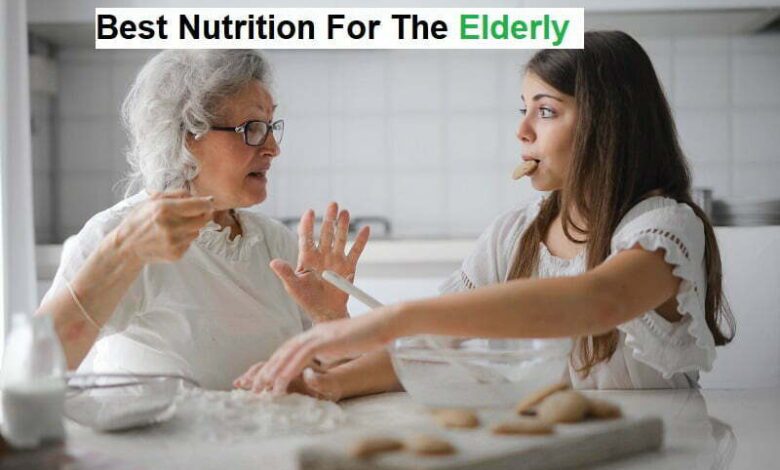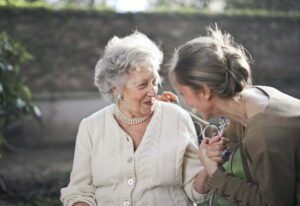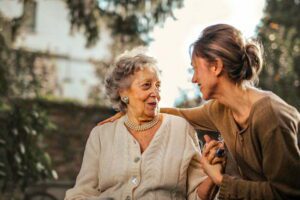
Best Nutrition For The Elderly
Healthy eating and nutrition for the elderly is greatly impacted by several factors, one of them being a change in body composition.
During the later years in life, the body will lose bone and muscle and gain fat because the hormones aren’t very active anymore.
There are many factors which hinder an elderly person’s health.
The information below will help you to lead a healthy life – no matter how old you
may be.
Water
Water in the body decreases with age, so many older folks will become dehydrated very easily. Sometimes they won’t feel thirsty, while other times it’s too much work to pour a glass a water.
With this in mind, it’s recommended that they drink at least 1 ounce of water for every 2.2 pounds of weight.
Protein
At this stage in life, protein is very important. Protein is needed to support a healthy immune
system and prevent the wasting of muscle. Since energy needs are less, older folks should eat high quality protein such as eggs, lean meats, poulty, and fish.

Carbs and fiber
Carbohydrates are the main source of energy for the entire body. You can find carbs in bread, cereals, pasta, and other grain products. A diet that’s high in fiber and water will help to prevent constipation as well.
Fat
Fat intake for the elderly should be limited, not eliminated. You can limit fat by choosing lean meats, low fat dairy products, and food preperation methods that don’t include frying.
Iron
For the elderly, iron deficiency can be seen with those who aren’t eating much. Good sources for iron include lean red meats or breakfast cereals.
Zinc
Zinc intake is normally with the elderly, and to make matters worse, it’s not absorbed very well
either. Meat, poultry, and fish should be a part of your diet to help you meet the requirements for zinc.
Calcium
Calcium is one ingredient that most elderly folks simply aren’t getting enough of. Most believe that milk upsets their stomach, and therefore they will avoid it.
They should be getting around 1,500 mg of calcium a day, and nonfat powdered milk can be used in recipes as a substitute for milk.
Other foods such as yogurt, low fat cheese, and broccoli can also help you meet the requirements for calcium.
Vitamin B12
In order to absorb the benefits of B12, the intrinsic facotr must be produced by the stomach. Most elderly
people suffer from a deficiency in B12 because they have a condition known as atrophic gastritis.
This condition causes inflammation of the stomach, bacterial overgrowth, and the intrinsic factor. Without the intrinsic factor, this vitamin can be absorbed.
Each one of the above nutrients are needed to keep an aged body in good health. Elderly individuals should try to stay active and strive for a well balanced diet.
Even though the aged body isn’t the same as it used to be, proper care and the right nutrients can help the elderly enjoy a healthy and long life.
Why The Elderly Must Take Antioxidants
Antioxidants are substances that are capable of counteracting the damaging, but normal, effects of the physiological process of oxidation in animal tissue.
Antioxidants are nutrients as well as enzymes (proteins in your body that assist in chemical reactions). They are believed to play a role in preventing the
development of such chronic diseases as cancer, heart disease, stroke, Alzheimer’s disease, Rheumatoid arthritis, and cataracts.
Why the Elderly Must Take Antioxidants
Many researchers claim that elderly people, especially those who have reduced their food intake, frequent aspirin users,
heavy drinkers, smokers, and people with impaired immune systems may benefit from taking antioxidant supplements daily.
In terms of heart disease and stroke, it is possible that higher levels of antioxidants slow or prevent the development of arterial blockages,
a complicated process involving the oxidation of cholesterol. Moreover, antioxidants may deter the collection of plaque on arterial walls.

Exercise and Free Radicals
Exercise in untrained individuals overwhelms defenses resulting in increased free radical damage. Thus, the “weekend warrior”
who is predominantly sedentary during the week but engages in vigorous bouts of exercise during the weekend may be doing more harm than good.
To this end there are many factors which may determine whether exercise induced free radical damage occurs, including degree of conditioning of the person, intensity of exercise, and diet.
Because Free Radicals have one or more unpaired electrons, free radicals are highly unstable. They scavenge your body to grab or donate electrons, thereby damaging cells, proteins, and DNA (genetic material).
The same oxidative process also causes oils to become rancid, peeled apples to turn brown, and iron to rust.
Sources of Antioxidants!
Consuming more antioxidants helps provide the body with tools to neutralize harmful free radicals. It’s estimated that there are more than 4,000 compounds in foods that act as antioxidants.
The most studied include vitamins C and E, betacarotene and the mineral selenium.
nutrition for elderly,nutrition in elderly ppt,malnutrition in elderly,component health diet for older adults,the best diet for the elderly,information about healthy food,best food for elderly,carbohydrate requirements for elderly,